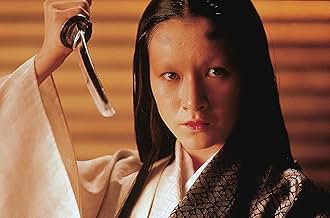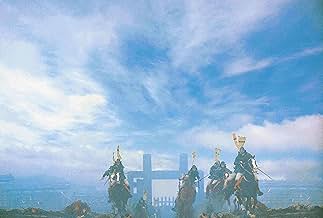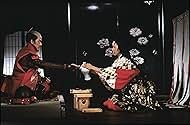No Japão medieval, um senhor feudal decide abdicar e entregar seus domínios aos seus três filhos. Mas ele não é capaz de ver que esses novos poderes irão corrompê-los e levá-los a enfrentar ... Ler tudoNo Japão medieval, um senhor feudal decide abdicar e entregar seus domínios aos seus três filhos. Mas ele não é capaz de ver que esses novos poderes irão corrompê-los e levá-los a enfrentar um ao outro, e contra ele.No Japão medieval, um senhor feudal decide abdicar e entregar seus domínios aos seus três filhos. Mas ele não é capaz de ver que esses novos poderes irão corrompê-los e levá-los a enfrentar um ao outro, e contra ele.
- Direção
- Roteiristas
- Artistas
- Ganhou 1 Oscar
- 30 vitórias e 23 indicações no total
Mansai Nomura
- Tsurumaru
- (as Takeshi Nomura)
Resumo
Reviewers say 'Ran' is celebrated for its epic scale, masterful direction, and stunning visuals. Adapted from Shakespeare's 'King Lear,' it is lauded for its intricate narrative, powerful performances by Tatsuya Nakadai and Mieko Harada, and deep exploration of power, corruption, and betrayal. The cinematography and battle scenes are noted for their grandeur. Some find its slow pace and long runtime challenging, yet it is often hailed as one of Kurosawa's finest works.
Avaliações em destaque
The 'Kurosawa' adaptation of King Lear in his film 'Ran' is a tremendous memorable film.
It is a very dramatic film with many soliloquies and dialogue, but if you are patient with it, you are treated to some of the most epic scenes of cinematic brilliance that Kurosawa made. After all it is Shakespeare and one must be patient with it if they are not a fan of the old school theatre.
Colourfull clashing armies, The lord awaiting his fate in a burning castle, a brilliant execution scene (I consider the BEST I have ever seen film ever), and the blind being left in the hands of Buddha?
While Seven Samurai will always be his perfection, Ran is more than an enjoyable movie that should be seen. Just stick with it and you'll never forget it.
Rating 9 out of 10.
It is a very dramatic film with many soliloquies and dialogue, but if you are patient with it, you are treated to some of the most epic scenes of cinematic brilliance that Kurosawa made. After all it is Shakespeare and one must be patient with it if they are not a fan of the old school theatre.
Colourfull clashing armies, The lord awaiting his fate in a burning castle, a brilliant execution scene (I consider the BEST I have ever seen film ever), and the blind being left in the hands of Buddha?
While Seven Samurai will always be his perfection, Ran is more than an enjoyable movie that should be seen. Just stick with it and you'll never forget it.
Rating 9 out of 10.
One of the last great films directed by Akira Kurosawa. A father gives his land and his power to his three sons. They turn against each other and against their father.
Based on Shakespeare's King Lear 'Ran' is a very good film. It was very expensive and you can see that. Over ten years Kurosawa was busy on this project and in 1985 it was finally there. Very well made, with beautiful costumes, music and cinematography, a great direction and some good performances. Although I think Kurosawa has done better ('Rashomon', 'Ikiru', 'Yojimbo' and of course 'Shichinin no Samurai') 'Ran' definitely belongs to his best.
Based on Shakespeare's King Lear 'Ran' is a very good film. It was very expensive and you can see that. Over ten years Kurosawa was busy on this project and in 1985 it was finally there. Very well made, with beautiful costumes, music and cinematography, a great direction and some good performances. Although I think Kurosawa has done better ('Rashomon', 'Ikiru', 'Yojimbo' and of course 'Shichinin no Samurai') 'Ran' definitely belongs to his best.
Akira Kurosawa's 1985, Ran, is based one of Shakespeare's greatest works, King's Lear. The Film proudly stands along with his other classic such as Seven Samurai, Yojimbo, Roshomon, Sanjuro and the Hidden Fortress. He is a master in the art of filmmaking, no one can film an epic battle scene quite like Kurosawa. This is recognized as the most expensive film ever made by Akira Kurosawa, it was at that time, Japan's most expensive film ever. Being at the age of 75, he still showed us, he's one of the best in the business.
This movie is about an aging lord, head of the Ichimonji family, decides to retire and to pass the power to Taro, the eldest of his three sons. He will however have to banish Saburo, the youngest one, who dared to speak the truth to him. Soon, the former lord is chased away from the castles of his sons and becomes mad when he understands that one of his sons is trying to kill him. The three brothers are fighting for control of the Kingdom, as their lust for power grows every day. Four armies are facing each other on the prairie. Lord Ichimonji's former peaceful kingdom is nothing but a distant memory.
Akira Kurosawa redefines what an epic film is, with astonishing story telling, entirely believable characters and real life battle scenes without the use of Special effects/CGI. He retells the story of King Lear in his own way and no one would recognize that it was actually a adaptation beforehand. But just like Shakespeare, there is humor, irony, death and not a happy ending. Everyone who played a part in the production of this film, deserves some kind of recognition. The acting is pretty much excellent and certainly believable.
10/10 Kurosawa is a Genius
This movie is about an aging lord, head of the Ichimonji family, decides to retire and to pass the power to Taro, the eldest of his three sons. He will however have to banish Saburo, the youngest one, who dared to speak the truth to him. Soon, the former lord is chased away from the castles of his sons and becomes mad when he understands that one of his sons is trying to kill him. The three brothers are fighting for control of the Kingdom, as their lust for power grows every day. Four armies are facing each other on the prairie. Lord Ichimonji's former peaceful kingdom is nothing but a distant memory.
Akira Kurosawa redefines what an epic film is, with astonishing story telling, entirely believable characters and real life battle scenes without the use of Special effects/CGI. He retells the story of King Lear in his own way and no one would recognize that it was actually a adaptation beforehand. But just like Shakespeare, there is humor, irony, death and not a happy ending. Everyone who played a part in the production of this film, deserves some kind of recognition. The acting is pretty much excellent and certainly believable.
10/10 Kurosawa is a Genius
Throughout his career Kurosawa strove to achieve what he called "real cinema", proclaiming that "in all [his] films, there's [only] three or four minutes" of such quality. Many would argue that he was his greatest critic. For if not in "Seven Samurai", then definitely in "Ikiru" and if not in "High and Low", then definitely in "Rashomon" he must have achieved this plateau of greatness. Well, if not in any of his other films, then definitely in "Ran" Kurosawa finally came to the apex of cinematic artistry. With the both lyrical and grandiose tone of its craft, its beautifully spare imagery, its haunting score by Toru Takemitsu, and its lead Tatsuya Nakadai's masterful understated performance, "Ran" is perhaps the most fully realized epic ever made.
The tale, which is an adaptation of Shakespeare's "King Lear", begins as Lord Hidetora Ichimonji and his court are out hunting. During a break in the hunt, Hidetora proclaims his adbication from the hight seat of the Great Lord and bestows his lands unto his three sons, dividing them up equally. He declares his oldest to be his successor in power. When his youngest son and one of his faithful nobles, express their concerns on this idea, Hidetora foolishly banishes them both, mistaking their advice as insolence. With this opening scene, the peaces are aligned and soon 'chaos' as the film is aptly named will break out throughout the land. From here, we see the downfall of Hidetora and all those who surround him. The film retains all the themes of the original play, but also thanks to Kurosawa's own input addresses a slew of even more varied ideas. Like Shakespeare, Kurosawa is greatly interested in the responsibility of the leader and the hypocrisies and ironies of an autocratic system. The most obvious though not the central theme in the whole film is war, and Kurosawa explores this theme to its full extent throughout the film. In perhaps the most grandiose battle scene every filmed, he demonstrates the destructive consequences and the paradoxical beauty of conflict.
Here, Kurosawa implements the camera with masterful skill not once employing the editing/photography tricks and gimmicks so often seen in films (even the good ones) today. This director has an awareness of the past and the history of film, but also the creative spontaneity of a true genius. In "Ran", he focuses on the more methodically simple yet artistically complex montage of Eisenstein, and on the strict compositions of Ozu. He employs the most basic and yet most artistic of techniques. Each shot is planned to precision, and each cut is made for a purpose. The coreagraphy and blocking of each scene is simple and powerful, and Kurosawa allows the actors to play out these scenes without the intrusion of the camera or the editor. Thus, the director prevents the style from eclipsing the already powerful material he has to work with. Simply put, "Ran" is a masterpiece that flows and develops like an opera, from its forebodingly peaceful ouverture to its bloody Shakespearean heart until its final, quietly subdued, and sorrowful denouement.
The tale, which is an adaptation of Shakespeare's "King Lear", begins as Lord Hidetora Ichimonji and his court are out hunting. During a break in the hunt, Hidetora proclaims his adbication from the hight seat of the Great Lord and bestows his lands unto his three sons, dividing them up equally. He declares his oldest to be his successor in power. When his youngest son and one of his faithful nobles, express their concerns on this idea, Hidetora foolishly banishes them both, mistaking their advice as insolence. With this opening scene, the peaces are aligned and soon 'chaos' as the film is aptly named will break out throughout the land. From here, we see the downfall of Hidetora and all those who surround him. The film retains all the themes of the original play, but also thanks to Kurosawa's own input addresses a slew of even more varied ideas. Like Shakespeare, Kurosawa is greatly interested in the responsibility of the leader and the hypocrisies and ironies of an autocratic system. The most obvious though not the central theme in the whole film is war, and Kurosawa explores this theme to its full extent throughout the film. In perhaps the most grandiose battle scene every filmed, he demonstrates the destructive consequences and the paradoxical beauty of conflict.
Here, Kurosawa implements the camera with masterful skill not once employing the editing/photography tricks and gimmicks so often seen in films (even the good ones) today. This director has an awareness of the past and the history of film, but also the creative spontaneity of a true genius. In "Ran", he focuses on the more methodically simple yet artistically complex montage of Eisenstein, and on the strict compositions of Ozu. He employs the most basic and yet most artistic of techniques. Each shot is planned to precision, and each cut is made for a purpose. The coreagraphy and blocking of each scene is simple and powerful, and Kurosawa allows the actors to play out these scenes without the intrusion of the camera or the editor. Thus, the director prevents the style from eclipsing the already powerful material he has to work with. Simply put, "Ran" is a masterpiece that flows and develops like an opera, from its forebodingly peaceful ouverture to its bloody Shakespearean heart until its final, quietly subdued, and sorrowful denouement.
Ran takes viewers to a place they would rather not explore on their own. In a world of cruelty, Kurasowa has shown how the moments within the horror can have beauty. Shakespeare wrote King Lear as a mirror on the human condition. We do not have to be kings and princesses to identify with the father's desire for the well being of his children, even if his own life was one of cruelty and pain. We see this theme throughout great literature and film. What Ran has done is to provide the viewer with many small moments within the pain to realize the beauty. Even the moment of epiphany for Hidetora, when his actions achieve his madness, is one of surpassing beauty. As the storm rages outside the small house of the prince he blinded, whose parents he killed, whose sister he forcibly married off, the simple sounds of the flute provide an intense focus on the here and now. It is at this moment when Hidetora recognizes that he himself sowed the seeds of his own destruction. There is no dialogue, no swashbuckling, just the terrible beauty of the music. As with many of Kurasowa's films, despite their epic scope, it is the small paint strokes that make up the master's canvas.
Você sabia?
- CuriosidadesAkira Kurosawa's wife of 39 years, Yôko Yaguchi, died during the production of this film. Kurosawa halted filming for just one day to mourn before resuming work on the picture.
- Erros de gravaçãoDuring the siege on the third castle, the corpse of one of Hidetora's guards suddenly shuts his eyes just before a volley of arrows flies past him.
Principais escolhas
Faça login para avaliar e ver a lista de recomendações personalizadas
Detalhes
Bilheteria
- Orçamento
- US$ 11.500.000 (estimativa)
- Faturamento bruto nos EUA e Canadá
- US$ 4.314.927
- Fim de semana de estreia nos EUA e Canadá
- US$ 3.567
- 2 de jul. de 2000
- Faturamento bruto mundial
- US$ 4.385.618
- Tempo de duração2 horas 40 minutos
- Cor
- Proporção
- 1.85 : 1
Contribua para esta página
Sugerir uma alteração ou adicionar conteúdo ausente



































